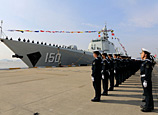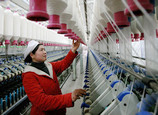
"China is catching up with other economies, so it's more expensive," he said. "You could say it is the price of success. It's a small price to pay, because wage inflation in China is still keeping up with the receding cost-of-living inflation, at the moment anyway."
Five years ago, Shanghai was ranked at 53 in the world.
Robert Theleen, chairman of the American Chamber of Commerce in Shanghai, has seen living costs rocket during his 32-year stay in China.
"In cities like London or Chicago, they have well-developed logistics and supply chain management. That creates a fully competitive market which helps to cut costs," Theleen said.
He said the service culture is not taking hold simply because people are used to relying on cheap labor. But this is changing as labor costs rise.
"It didn't matter 10 years ago. But now, to run a restaurant, you need to take advantage of modern technology to offset surging wages. If not, you will need to charge more to offset the costs," he said.
Theleen forecast that five years from now, Shanghai will experience a lowering of costs as the city replaces cheap labor.
The biannual survey compares more than 400 individual prices across 160 products and services in 140 cities. The index measures the cost of an expatriate lifestyle using a weighted average of products and services.
According to Theleen, the reason that Tokyo is stuck with high prices is largely because they haven't changed their distribution system, which is highly complicated and inefficient.
"If you export to Japan, you will have to go through four layers of distributors, to get to the customers," he said.


















 Most feared Spring Festival questions
Most feared Spring Festival questions


![]()
